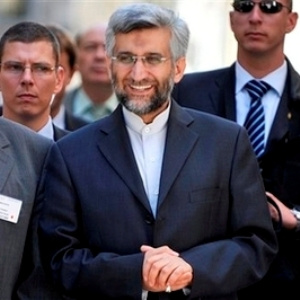Iranian Carpet and Western Fast Food

Jalili’s analogy between Iranian diplomacy and its carpets expressed at the end of Geneva talks demonstrated that Iran is in no hurry to reach a conclusion in its negotiations with West.
If Iranian diplomacy prefers to have a millimeter by millimeter progress like the carpet weaving process, West will fall into more doubts in continuing negotiations. They are fretting to reach a conclusion.
Westerners have become accustomed to fast food culture and now they want to achieve the results in the shortest time. Pressure cooker has been the fruit of European culture and now this culture has entered their diplomacy.
West’s diplomacy lacks the patience it once practiced. For today’s western diplomacy every minute that is wasted can bring about huge economic and political loss. That’s why ’time’ has turned into a determining factor in negotiations.
However, Tehran’s diplomacy originates from Eastern culture, more precisely, a Middle Eastern culture.
It’s true that fast food restaurants have mushroomed during the recent years in Tehran and some citizens have got used to it, but Iranian diplomats still avoid the fast food culture and follow the traditional diplomacy: slow but continuous.
Michael Hirsch from Newsweek has compared Iran’s nuclear strategy to Scheherazade’s fairly tell, in which "the Persian Queen Scheherazade strings out stories for a thousand and one nights until her matricidal husband, the king, finally accepts her in his household". Hirsch thinks that Tehran may be "endlessly prolonging the talks until an exhausted United States and Europe are forced to accept its uranium enrichment program".
United States is really concerned if Iran follows the "Scheherazade strategy". And Jalili’s analogy has added to the concerns.
Condi Rice had accused Iran of stalling about its nuclear position. To force Tehran speed up its pace in negotiations, they gave Iran two weeks to agree to freeze its uranium enrichment program.
But in Tehran, Iranian officials haven’t taken the deadline seriously. Instead, Iran has proposed a plan for nuclear negotiations that if carried out, can last for months. Iran has invited them to talk on terrorism, global security crisis, environmental issues and similar subjects, but these are not what West is seeking. What they want is Tehran’s answer of yes or no to uranium enrichment halt.
Prolonged negotiations with Iran have caused big problems for West. Iran’s case has affected nearly all plans West is following in the Middle East and they can’t negotiate with Iran forever.
For instance, rise of energy prices in the world is in part because of worries about Iran’s nuclear case. European investment projects in Iran have been suspended due to United Nations and West sanctions; and this has increased unemployment and economic recession in some European countries. West does not want to continue the sanctions and move on with the ups and downs of this story.
They really seek a way to convince Tehran follow the fast food diplomacy, though the Iranian TV warns citizens about the disadvantages of fast foods.
Iranian diplomatic taste is not at all interested in ’fast foodian’ negotiations and changing this taste is not an easy thing. Therefore, if Iran and West avoid changing their diplomatic taste, the future of talks won’t look so rosy. That is, neither the Westerners will wait for the Iranian carpet to be woven, nor will Iranians taste the Western fast food.

